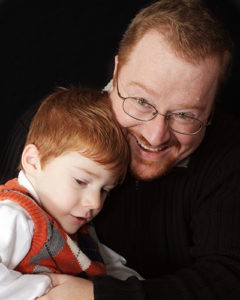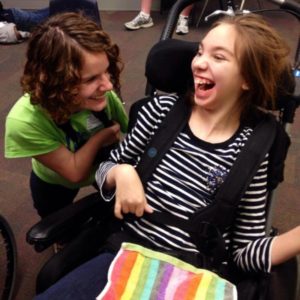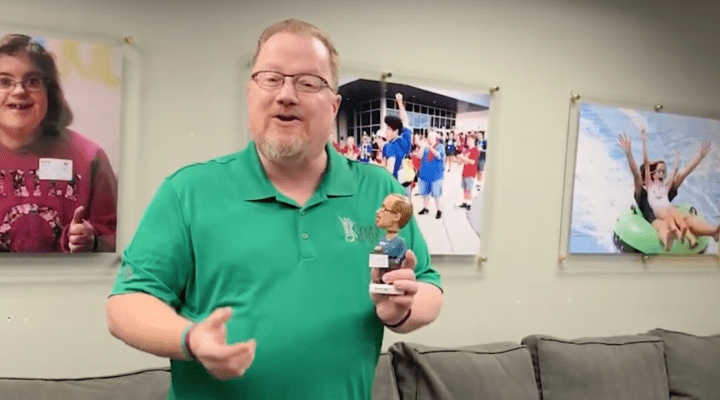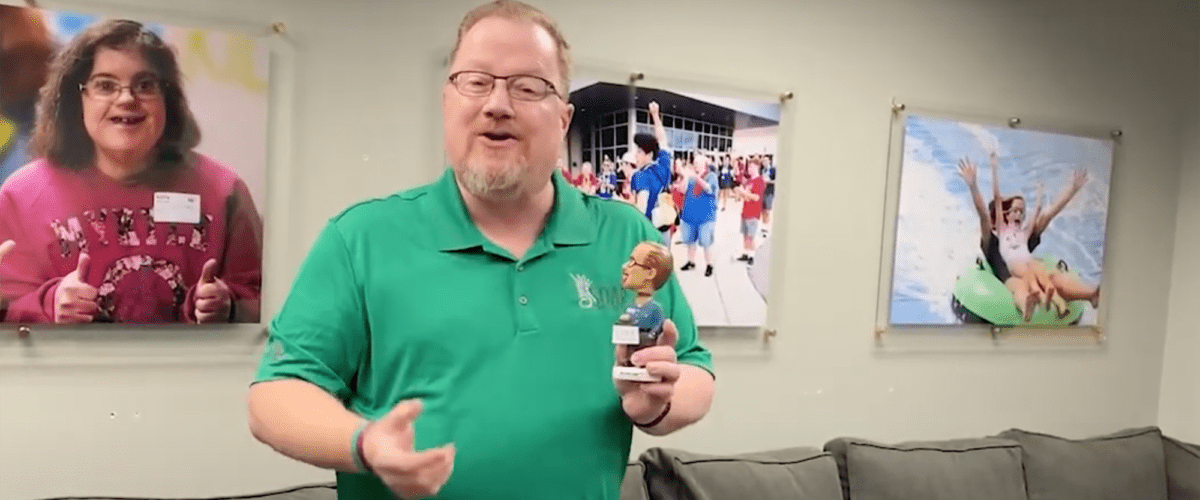Kids always have been integral to Stephen “Doc” Hunsley’s calling. As a pediatrician, he tended to the physical needs of a variety of children. For the past decade, though, Hunsley’s work took him in a different direction, leading SOAR, a nonprofit in Kansas City that exists “to empower families with disabilities to soar in their faith communities.”
SOAR is an acronym for Special Opportunities, Abilities and Relationships. The organization aims to answer three questions that parents of children with special needs have:
- Will my child be able to provide for himself or herself?
- Who is going to take care of my child when I’m gone?
- Who is going to take care of me?
“These are the questions that keep parents up at night,” Hunsley said.
A son’s diagnosis
Hunsley knows this from personal experience. His middle child, Mark, was born with Dravet Syndrome, a rare genetic seizure disorder that caused developmental delays and autism.
 After Mark’s birth, Hunsley quit his job as a pediatrician to become a stay-at-home dad.
After Mark’s birth, Hunsley quit his job as a pediatrician to become a stay-at-home dad.
“It was the first time in our lives that my wife and I knew the stress of being a parent — it’s 24/7, 365,” he said.
Compounding the stress was the reaction of others.
“I’ve been told I’m a horrible parent because my son had an autistic meltdown,” Hunsley said. “People have told me it’s poor discipline when in fact it’s autism.”
“It’s ignorance not understanding autism,” he added. “This is what every family with disability goes through when they’re out in public.”
Although Mark died in 2010 at the age of 5½, his legacy endures through SOAR.
‘I needed to heal’
“My son is the reason SOAR exists,” Hunsley explained. “Everything I’m doing is because of him.”
After Mark’s death, “I needed to heal physically, spiritually and emotionally. To do that, I needed to serve.”
In 2011 — less than a year after Mark died — Hunsley approached the children’s minister at Grace Church, where he and his wife attended.
“I told him I was there to serve,” Hunsley said. Not long after, he got a call from the children’s minister and the senior pastor. “They said they had been praying for a special needs ministry, and they asked me to start it.”
It was a natural fit for Hunsley, who, after hanging up his stethoscope, had been a children’s pastor at another church in the area.
At first, the special needs ministry at Grace Church served just three people. “Eight years later, we were serving 900 people,” Hunsley said.
Spinning off as an independent entity
At the end of 2019, Hunsley set his sights higher, leaving the staff at Grace Church and establishing SOAR as an independent organization to provide services to individuals with special needs and their families, as well as churches that want to create or expand their disability ministries. So far, Hunsley said, SOAR has helped nearly 400 churches throughout the United States, Canada and Brazil, with a 10-year goal to assist 1,000 churches.
Hunsley sees a huge need for more congregations to begin ministries for families with special needs, who often don’t attend church because either:
- They believe churches aren’t equipped to handle their child’s needs.
- They think their kids are a burden.
- Or they’ve been asked to leave their church before, and they don’t want to be asked to leave again.
A biblical imperative
But Hunsley said churches are commanded to serve and welcome those with disabilities.
“In Luke 14, there is the great wedding feast, and in there Jesus says, ‘Bring in the blind and give them a seat at the table, a seat of honor,’ Hunsley said. “Jesus is saying that those with disabilities need the church as much as the church needs those with disabilities.”
 Hunsley noted that very few church leaders ever have been exposed to someone with a disability. But 1 in 4 people in the U.S. are disabled, and 1 in 6 kids has an intellectual disability.
Hunsley noted that very few church leaders ever have been exposed to someone with a disability. But 1 in 4 people in the U.S. are disabled, and 1 in 6 kids has an intellectual disability.
“So if you have a children’s ministry of more than five or six kids, chances are, you have someone with a disability,” Hunsley said. “It’s not enough to say they can go somewhere else. That’s not what Jesus would say.”
Case-based training
Part of what SOAR provides is case-based training that Hunsley developed in consultation with special needs educators.
“In medicine, we teach with cases,” Hunsley explained. “I created 10 case-based scenarios that we discuss in the training so that every volunteer knows how to handle the situation and can easily apply the training.”
That training comes in handy during respite nights where, pre-COVID, up to 150 people with disabilities would be paired with a buddy.
“We take all ages, all diagnoses and all abilities, from birth to 71 years of age,” Hunsley said.
SOAR also offers programming for siblings, who can spend time with other people who understand what it’s like to have a family member with special needs.
In addition, Hunsley hosts regular web chats with special needs experts on SOAR’s YouTube channel. Recent topics include how to support a child’s mental health during the pandemic and using social media to expand your disability ministry.
Day camp and conference
During the summer, SOAR hosts a day camp, open to people of all faiths, where “the focus is on abilities, not disabilities,” Hunsley said. There, participants can enjoy water slides and zip lines and learn stories about people in the Bible who have disabilities.
At a recent camp, Hunsley said, a Muslim family stopped him and said that while they don’t agree with Christian beliefs, it was the first time in their lives that they didn’t question why their child was disabled. “They realized he had a purpose.”
“Everything we do from now on will have virtual and in-person components so we can reach as many people as possible.”
In the fall, SOAR hosts Wonderfully Made, a conference for families and ministries focused on special needs.
This past year, the conference was virtual, and although Hunsley hopes to resume some in-person programming in the coming year, “everything we do from now on will have virtual and in-person components so we can reach as many people as possible.”
Expanding its reach
Already, SOAR’s reach has expanded well beyond the Kansas City area.
“We have people from all over the nation and the world,” Hunsley said, noting that recently a family from Romania participated in one of SOAR’s events.
Indeed, Hunsley said, “My little red-headed boy is touching more people than I could have ever dreamed.”
“We are becoming national, and we’d love to have offices in every major city,” Hunsley said. “We want to take our summer camp on the road, and we want to hold our Wonderfully Made conference in other cities.”
Future plans
Hunsley has other plans, too.
“We want to be able to provide 48-hour respite care, Friday night to Sunday night, with a job training center during the day,” he said. The intent would be to identify each individual’s passions and then train employers on why it is beneficial to employ people with disabilities.
After all, Hunsley said, “That employee could be the best they ever had, but if they don’t employ them, they’ll never know that.”
“People with disabilities don’t just need to be greeters at Walmart or work at AMC,” Hunsley said. “They can do so many things — we just have to find out what they’re passionate about and find opportunities for them.”
“We need to take families with disabilities and have them serve all over the world.”
Hunsley also wants to create residential facilities, as well as all-inclusive baseball fields, not only in Kansas City but nationally and internationally.
And he wants to create mission trips specifically for people with special needs. “We need to take families with disabilities and have them serve all over the world. That will be powerful.”
‘We always need more’
Of course, to do all this requires volunteers, and lots of them. Currently, SOAR has more than 2,500 volunteers.
“We always need more,” he said. “Not just working with people with disabilities but helping with siblings, behind the scenes, food, administration, games. As we continue to grow and look to move into more things, we need more volunteers.”
For Hunsley, who often works 80- to 100-hour weeks, the bottom line is simple: “I will not rest until we can provide respite for every single family and until we can get every church to be entirely inclusive.”
This article was made possible by gifts to the Mark Wingfield Fund for Interpretive Journalism. Learn more at www.baptistnews.com/donate.


